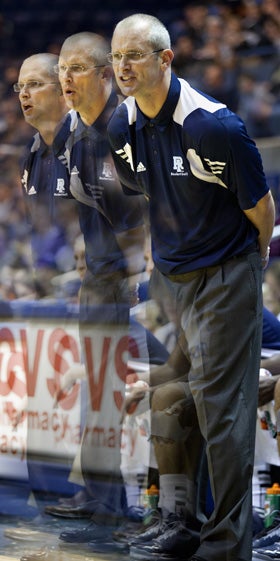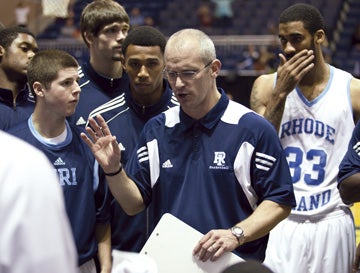Relentless
It’s 8:45 a.m. on October 17, and Dan Hurley is walking into Keaney Gymnasium for the fifth official day of practice with the URI men’s basketball team. He is dealing with a hoarse voice and, like so many other Rhode Islanders in the morning, carrying a cup of coffee from Dunkin’ Donuts.
For the next three hours, Hurley will set out upon a calculated itinerary of coaching, encouraging, correcting, and teaching with the 15 student-athletes wearing the blue and white practice gear. Each practice session begins with a goal, follows a minute-by-minute plan, and ends with a solution: becoming better than the day before.
The principles that guide day five do not differ from those of the previous 211 days since he was named the 19th head basketball coach in URI history. Every day poses a challenge. That challenge is taken on by the coaching staff and, this morning, taken out on the players.
“You have to be willing to do it the right way in all areas of your life.”
The whistle blows after a botched shooting drill. “On the line,” Hurley instructs: time to punctuate the moment with a few wind sprints. Practice continues, and the whistles sound off at the miscues—not enough talking on defense; four dribbles taken in a drill that allowed only three; an errant pass made worse with bad body language. On the line again.
“Our culture is development-demanded, and it’s not for everyone,” Hurley says. “We hold a high standard. You have to be willing to do it the right way in all areas of your life. You have to pay a price to play in our program. That had a huge impact on who stayed, who left, and who we’ll be bringing in through our recruiting.”

A visit to Hurley’s office in the Ryan Center provides a glimpse of his many achievements. Conversation with him reveals his knowledge and passion for teaching the game, combined with a laser-like focus on details, a razor-sharp wit, a low tolerance for distraction, and an uncanny ability to get the most out of everyone associated with his program.
“We are starting to establish our expectations in terms of pace and tempo in the gym, weight room, and classroom,” Hurley says. “It has to be a total buy-in for our players, because this is probably the hardest thing they have ever done and the hardest they have ever worked.
“We are teaching guys how they will exist in our program, how they will be micromanaged socially, academically, and athletically,” Hurley adds. “We’re on them every single second of the day.”
Hard work is a Hurley trademark. Growing up in Jersey City, N.J., Dan and his brother Bobby—now serving as associate head coach at URI (center in photo below)—were standouts for St. Anthony High School, playing for their father Bob Sr. Memorialized in Adrian Wojnarowski’s New York Times bestseller The Miracle of St. Anthony, the story of New Jersey’s first family of basketball has become legend.
Over the past 40 years, Bob Hurley Sr. has won more than 1,000 games, 27 state parochial titles, and 26 state championships, with seven undefeated seasons. While playing for their Hall of Fame father, the brothers were exposed to a basketball culture that would take their game to the highest levels of the sport. It also taught lifelong lessons—ones that shaped their successful playing and coaching careers.
 Dan Hurley jokes that, early in his playing career at Seton Hall, he knew he was destined to coach.
Dan Hurley jokes that, early in his playing career at Seton Hall, he knew he was destined to coach.
“My first game in the Big East was against Georgetown,” he recalls. “I pulled up for a jump shot, and both Alonzo Mourning and Dikembe Mutombo jumped to block it. I’m not sure which guy got it, but it went about 20 rows up into the stands. That’s when I knew my future in basketball was in coaching.”
Hurley enjoyed a fine collegiate career, eclipsing the 1,000-point mark while helping the Pirates advance to two NCAA tournaments during one of the strongest periods in the history of the Big East. In his first trip to the Big Dance, Dan Hurley and Seton Hall advanced to the Sweet 16, taking on Duke and Bobby Hurley. A photo of the two Hurleys going head-to-head—certainly not for the first time—sits on the desk of Dan’s Ryan Center office.
“It is a family story for us,” he said in an interview with the New York Post. “It has been real neat spending every waking minute together. It is almost like when we were growing up.”
Dan Hurley’s first foray into college coaching was anything but “neat.” After his graduation from Seton Hall in 1996, Hurley joined the coaching staff at Rutgers. Who better to tap into the rich pipeline of recruits from the Garden State?
An infamous Scarlet Knights’ practice left Hurley red-faced and ultimately jaded about the college game. Soon after, a coaching change purged the entire staff. While normally a stressful time in a young coach’s life, Hurley’s departure from Rutgers was a giant blessing in disguise—the shiniest silver lining in the storm cloud of his coaching career.
“By being a college coach, I was being a worse dad than mine was for me,” Hurley explained in The Miracle of St. Anthony. “You want to be a better dad than your father was. And that was hard. I wasn’t exactly traveling around the world doing God’s work. I was traveling around making nice money and basically being a salesman. It was pretty pathetic.”
Despite his feelings about the profession at the time, his reputation as a tactician was never questioned. Rob Lanier, former head coach at Siena College and current associate head coach at Texas, saw Hurley’s stardom early on. “Danny was a better coach than anyone on the [Rutgers] staff. All his life, he had so many things ingrained in him from one of the best basketball minds in the world. Nobody taught the game better than him. Nobody thought it better than him. From a technical standpoint, he was far superior to the rest of us.”
Hurley found solace at St. Benedict’s Prep in Newark, teaching American history and coaching basketball. And winning. In nine years, he registered a 223–21 overall record and became the fastest coach in New Jersey basketball history to reach the 200-win mark.
Plenty of college opportunities came calling, but none piqued his interest until 2009, when he was offered the head coaching position at Wagner College in Staten Island, N.Y. Devotion to his high school players and intense loyalty to St. Benedict’s made it a tough decision that was even more painful to explain.
“He was never taught to leave. He didn’t know how,” said St. Benedict’s headmaster Fr. Edwin Leahy in a 2010 New York Times interview. Fr. Leahy knew what was coming in the phone conversation. But all he heard was hemming, hawing, hyperventilating, and finally a hang-up.
“I couldn’t finish, it got so painful,” Hurley recalled. “I couldn’t contain my emotion. I said, ‘I’ve got to call you back.’”
Eventually he got through that call and took over a Wagner program that ranked near the bottom of the national standings in just about every category. The Seahawks had won just five games the previous season and had a dismal grade-point average. Hurley set about to change the culture quickly.
The first season, Wagner was picked 11th out of 12 in the preseason poll but finished sixth. The Seahawks used their eight-win improvement—the nation’s best turnaround—as a springboard into a record-setting 2011–12 campaign. Hurley guided the team to its best-ever start (14–3) en route to a school record in wins (25). Along the way, Wagner downed #15 Pittsburgh, 59–54, snapping a 70-game—losing streak by Northeast Conference teams against the Panthers. It was also Wagner’s first victory over a ranked opponent in 33 years.
The speed of his success was significant. Dan Hurley became the hot name on every athletic director’s list. When Rhode Island began its coaching search, he was the top choice.
“I didn’t anticipate that I’d be making a decision like this for several years,” Hurley explained of his move from Staten Island to Rhode Island. “It was a very difficult thing to do.”
Hurley insisted on telling his team face-to-face, even if that meant waiting for spring break to conclude and delaying his official introduction at Keaney Gymnasium. No matter how difficult or uncomfortable, there is only one way to do things in the Hurley family—The Right Way.
An hour into practice, the Dunkin’ Donuts cup is half-empty. Hurley’s new drink of choice—VitaminWater—is half-full, much like his approach to coaching this season.
“We want to go from being the ‘Running Rams’ to a team that is ‘Ram Tough,’” Hurley remarks.
It is a process. Coaching. Teaching. Transformation.
“My brother and I would not have left a Wagner program that was on the verge of being great—and kids we loved dearly—unless we felt we could build a program here,” he says. “We want a program that can compete every year for a championship, one that can get very used to playing in the NCAA tournament and be a major factor in March.
“That’s what we came here to do. That’s what we came here to accomplish. With a total commitment by everyone involved, we believe it can be done.”
—Mike Laprey
 Home
Home Browse
Browse Close
Close Events
Events Maps
Maps Email
Email Brightspace
Brightspace eCampus
eCampus


